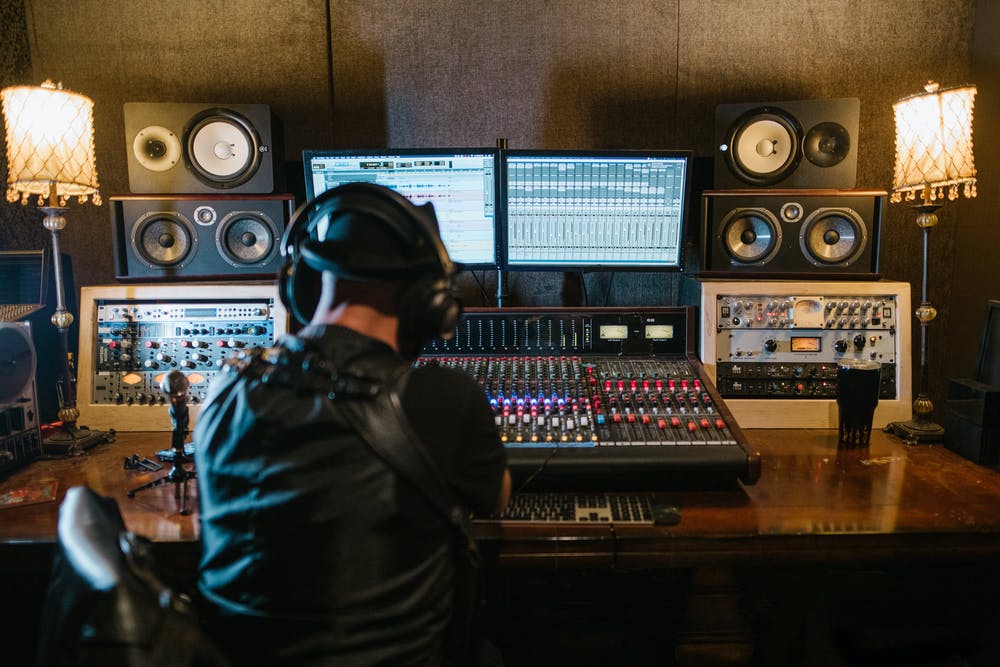When recording and producing your own music, it’s important to know what every step of the process entails. Just because you won’t actually be turning all the knobs or moving the mouse around on a computer screen, that doesn’t mean you shouldn’t follow the flow carefully.
When it comes to mixing and mastering what has been recorded, many artists are unsure of the difference between the two, yet both remain crucial steps in the music production process. Knowing the difference between mixing and mastering allows artists to have more control over their artistic process and make sure that their vision becomes a reality.
Keep reading to learn about the differences between mastering and mixing while producing music and how you can become proficient at doing both (or at hiring people to handle the two processes) as you record, produce, and then promote your music.

In This Article:
– Understanding Mixing As Part Of The Production Process
– Why Mastering Is Important To The Production Of A Song
– The Major Differences Between Mixing And Mastering
Understanding Mixing As Part Of The Production Process
Recording and producing great music means recognizing the role that mixing plays in the overall quality of a song. Being skilled at mixing requires extensive knowledge of the way that sounds work together to create something that is greater than each sound alone. Or, as Aristotle used to say, “the whole is greater than the sum of its parts.”
Mixing entails putting together multiple layers of audio to make one song. During the mixing process, audio will be tinkered with to ensure it works as well as is possible with other types of audio. Different pieces are made to be complementary so that disparate parts can create a cohesive whole. Sounds will be edited and vocals will be tuned. Equalization may be altered, filters and fades may be added, compression and delay may be incorporated, and the levels of certain instruments may be boosted. Special effects will be incorporated as needed. Unneeded frequencies and glitches in the audio may be removed.
Is your latest song ready for the world’s ears? Let us help you share it with the masses.

When mixing instruments and sounds, an audio mix engineer will find a balance between the volume, frequencies, dynamics, and spatial placements. These engineers focus on altering each instrument so that they’re not too hard or soft or affecting the way that other instruments sound. Certain instruments serve as the building blocks for other elements. For example, bass and percussion are often the first things incorporated into a song, and then other instruments and vocals are added on top of it. Many musicians don’t even realize this, but those in charge of mixing certainly do.
Audio mix engineers also have a deep understanding of how to manipulate certain sounds to create emotions while they work. They know which sounds elicit which emotions in those listening and can engineer songs to create a specific response, depending on what the artist is looking for. This may mean adding something into the beginning of the song to hook the listener then playing with timing and tension for the rest of the track to maintain that interest. This is complex work, which is why the best audio engineers are paid handsomely. See our blog on: How Much Does It Cost To Mix A Song?
Why Mastering Is Important To The Production Of A Song
Mastering is the act of polishing a track to make it even better. Mastering cannot occur until mixing has been completed. Whereas mixing involves assembling an audio track, mastering involves adding finishing touches to make it the best it can be before audiences have a chance to listen to it. Mastering is more concerned with the overall quality of the entire album, rather than each individual track on that project.
During the process of mastering, tracks will be compressed, equalized, and adjusted to achieve the specific effect that the artist desires. Fades will be added to the beginning and end of each song so there can be an easy transition from one track to the next. A good audio mastering engineer will also understand the order in which compositions should be placed on an album: there should be a seamless flow between all of the tunes to create an easy, smooth experience for the listener.
Another reason that mastering is important to the music production process is that it ensures that the sound across the entire album is consistent. The job of an audio mastering engineer is to give each song on an LP its own feel and identity, while maintaining a common style throughout the work.

If you’re about to finish your album, that means it’s time to start thinking about promotion, and that’s our speciality. Radio, magazines, blogs and even social media. What do you need help with?
Audio mastering engineers also understand compressing audio and making tracks into easily shared and played files. They will embed track information into the files, compress tunes at the correct ratio, move them from mono to stereo, alter them to be playable on any type of audio device, and then package them so that they can be shared with audiences everywhere. Audio mastering engineers also serve as quality control, ensuring that a song doesn’t contain any flaws before it is released to the public.
The Major Differences Between Mixing And Mastering
Mixing and mastering are both vital steps in the music production process. However, whether you should focus on one or the other depends on the overall sound that you want to achieve. Deciding which process is more necessary to the completion of your song rests upon how well you understand the difference between the two.
Mixing depends on consideration for all of the sounds involved in a track while mastering occurs after all those sounds have been mixed. Mixing involves the use of multiple audio files while mastering involves the use of only one. Mixing is largely responsible for the creation of emotion and style of a tune while mastering focuses on making the song sound professional and easily playable for radio promotion and on any type of stereo.
Speaking of radio promotion…maybe that’s exactly what you need to make your new song a hit. Call us so we can talk about it! (323) 952-5050



